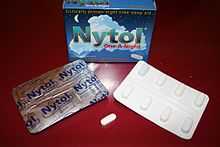Nytol

Nytol is a brand of sleeping pill produced by Prestige Brands. The active ingredient is diphenhydramine hydrochloride, a sedative antihistamine.
GlaxoSmithKline acquired the product in 2001 with the purchase of Block Drug.[1] GSK sold a number of OTC brands in 2011 to Prestige Brands.
Diphenhydramine enters the brain in significant quantities and causes drowsiness. It decreases the time taken to fall asleep and increases the depth and quality of sleep. This makes it helpful for the temporary relief of sleeping difficulties.
In the United Kingdom and Canada, it is available over the counter.
It is intended for short-term use as a sleep aid, or for alleviating effects of jet lag. It is available in both "One a night" and "Two a night" dosages. The maximum dose is 50 mg of diphenhydramine HCl per day.
Taking Nytol with alcohol is not recommended by the manufacturers. It is potentially dangerous to take more than the recommended dosage, and those on other medication or pregnant women should seek medical advice before using Nytol. As with any other sleeping pill, one should never drive after taking a dosage. Long term usage is also discouraged as tolerance to the effect occurs over a couple of weeks. Diphenhydramine is not addictive.
In Zambia, diphenhydramine is listed as a controlled and illegal substance under article 34, PtII of chapter 96 of the Laws of Zambia. Under the schedule listed in Regulation 2, possession of any amount of powders/tablets, including Nytol, containing 0.5 mg or more, or liquids containing 2.5 mg (or ml), of diphenhydramine is classed as trafficking.[2]
Nytol Herbal is a different product containing the herbal products hops, valeriana, and passion flower.[3]
References
- ↑ GlaxoSmithKline Completes the Purchase of Block Drug for $1.24 Billion -prnewswire - January 16, 2001
- ↑ "Narcotic Drugs and Psychotropic Substances Act, Cap 96". ZambiaLII. Zambia Legal Information Institute. Retrieved 4 April 2015.
- ↑ "Nytol UK - Nytol Herbal Tablets". Retrieved March 22, 2010.